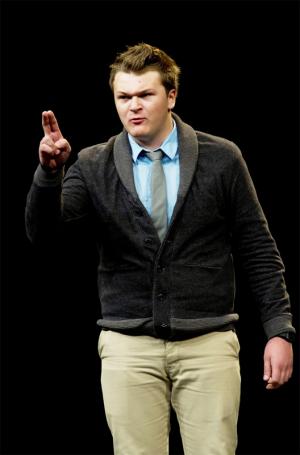Cape's Graves a national Shakespeare semifinalist
Cape Henlopen High School junior Hunter Graves was named a semifinalist in the English-Speaking Union of the United States National Shakespeare Competition, held in New York City.
Graves won the Delaware competition earlier this year, earning him a trip to New York City and his theater teacher, Martha Pfeiffer, a trip to England for a Shakespeare teaching course.
"The best part was meeting all the other people my age who are interested in theater and in Shakespeare," said Graves.
Graves performed a monologue by Shylock from "The Merchant of Venice" and "Sonnet 129." "I performed Shylock because I love the piece. I think that it's very good because it can be placed into a modern piece of work. It's in iambic pentameter, but it isn't rhymed, so it's like regular speech," Graves said.
"It starts with a declaration. In a competition setting, it works really well. I went 38th, so the judges could be sleeping. It grabs their attention," he said.
The sonnet, by contrast, is very introspective, he said, so it's a good piece to perform along with the monologue.
In all, 58 students attended the competition, including one from Mexico who did not compete.
All semifinalists watched each other compete, and Graves said it was instructional seeing all the different styles.
"The reason I won the Delaware competition was that I didn't move around a lot. At nationals, everyone but a few moved a lot," he said. Performers from the University of Delaware judged the Delaware competition and praised Graves for standing still on stage and letting the language speak for itself.
Pfeiffer said in "Hamlet," Shakespeare uses a character to tell actors how to act. "He says, 'Do not saw the air with your arms.' Shakespeare himself tells us in 'Hamlet' how not to act, how not to be amateur," she said.
She said Graves' performance was true to Shakespeare's instructions.
Pfeiffer's husband, Dr. Paul Pfeiffer of Salisbury University, said the competition showed the differences between the contemporary, American approach to Shakespeare and the more traditional, British school.
"The American approach is to treat Shakespeare's plays as any other more modern text in which the internal action is a vital part of the performance. This is the essence of 'method acting,' that only a part of the character's thoughts are spoken, as they are in real life," he said.
He said the British approach is more faithful to the text, while the American approach adds thoughts and actions that were not intended by the playwright, using gestures instead of more emphasis on the words.
Graves said the competition was instructive, but he is concerned that the more contemporary approach may be what colleges are looking for in prospective students, and he does not want to compromise his acting style.
"I'm not trying to please people, but to move them," said Graves, although he plans to continue competing.
Graves said he was introduced to Shakespeare this year in school. "I'd tried reading it before and gotten really confused, probably because I didn't know how to read it," he said.
In Pfeiffer's classes, Graves said, students focus not only on reading Shakespeare's works, but understanding the time period in which they were written and the style of speech.
"I understand them now, so I really like them," he said.
Graves said he is preparing to apply to universities, beginning with studying contemporary monologues and older characters. He said the University of North Carolina is his primary choice right now, along with Juilliard, but his dream school is the Royal Academy of the Arts in London.





















































